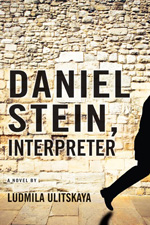

Overlook Press, hardcover, 9781590203200
Oswald Rufeisen might be called a saint; he lived a simple, selfless life, full of kindness and sacrifice. Truth is often greater than fiction, yet Ludmila Ulitskaya succeeds in fictionalising the life of Oswald Rufeisen as 'Daniel Stein' or Brother Daniel. She weaves a fascinating web of activity around Brother Daniel's life from his early life in Poland; through the years of the Second World War when he works for the Gestapo as an interpreter, yet saves many people from the Nazi death camps; to his years as a Jewish Catholic priest in Israel.
Daniel Stein is a novel of fragments, not in chronological order; the narrative is a jigsaw made up of individual documents: letters, transcripts of interviews, and extracts from newspapers. Each piece fits together to make a coherent whole. It is a great life, from the viewpoint of other people, and at the same time, a record of many individual experiences of the Second World War and the Jewish Diaspora. The structure of the novel is extremely engaging and makes the reader think and interact, to try to piece Daniel's story together.
So what is Daniel Stein actually about? The great suffering endured by millions of Polish Jews during the Second World War, the courage of many who fought for the lives of others, despair and the small glimmers of hope that shine through. We follow Daniel as he tries to find his place in life, through the eyes of others who admire him or remember him.
The novel has not been received without criticism; in the Complete Review of 6/6/11, Orthofer argues that it "ultimately seems less than its parts, the life, in the end, still too fragmentary. And ideologically one can take issue (many issues….) with much of it". Certainly, the sections of the novel that are devoted to an analysis of Jewish Catholicism versus Judaism could cause considerable consternation amongst religious readers. And on the other hand, amongst non-religious readers, the sections of ecumenical discussion could be frustrating or incomprehensible.
Putting the religious question aside, Daniel Stein, Interpreter was a joy to read; it is the kind of book that reminds
me why I love reading, the simple pleasure of discovering a new writer, a new way of writing and a fascinating subject matter.
The story itself and the characters that Ulitskaya creates or re-imagines are believable; they make mistakes, they hold
grudges and they hurt others. A best seller in Ulitskaya's native Russia, Daniel Stein, Interpreter is a novel worth piecing
together, so that you can see the full picture.
Ludmila Ulitskaya is Russia's bestselling literary novelist and has written fourteen novels, three tales for children, and
six plays. Daniel Stein, Interpreter won the Russian National Literary Prize and previous novels have received the Russian Booker
Prize, the Penne Literary Prize, and the Medici Award. Ludmila Ulitskaya was awarded the 2011 Simone de Beauvoir Prize, an international
human rights prize for women's freedom.
